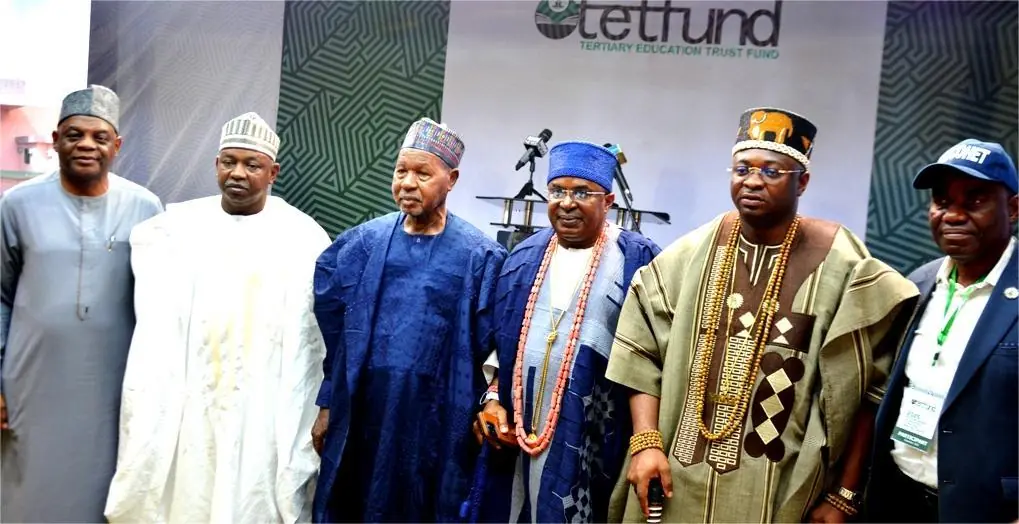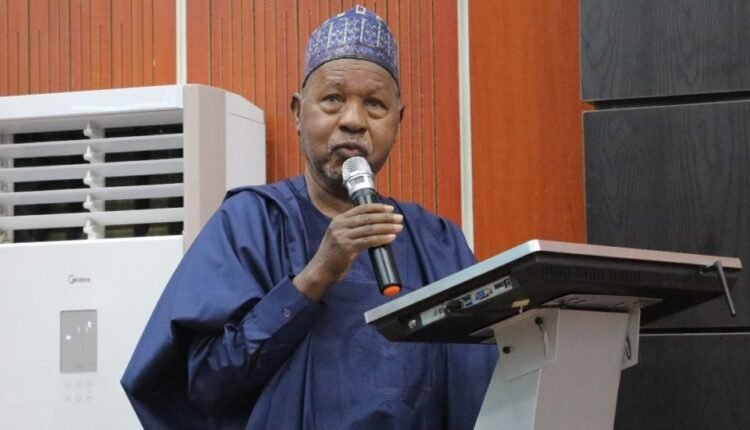TETFund is positioning tertiary education to thrive in digital world – Masari
TETFund is positioning tertiary education to thrive in digital world – Masari
The Chairman of the Board of Trustees of the Tertiary Education Trust Fund, TETFund, Rt. Hon. Aminu Bello Masari, has said the Fund is positioning tertiary education in the country in a way for it to thrive in the future, adding that this is necessary because the future of education is digital.
He stated this in Lagos on Monday while speaking at the 2025 National Town hall Meeting held with various stakeholders of the Fund.

This is just as the Executive Secretary of the Fund, Mr Sonny Echono, noted that Nigeria, which has a young population, could be a major exporter of intellectual assets to the world if the necessary investment is made in education.
Masari, who expressed the readiness of the Fund to contribute more to the realization of technological advancement of the country, added that various centres of excellence were being established by it to enhance research and development in the country.
“The future of education is digital, and TETFund is deliberately positioning Nigerian tertiary institutions to thrive in that future. Through the TETFund Education Resource and Administration System (TERAS) platform, we are digitising administrative processes, enhancing accountability, monitoring projects more efficiently, and supporting digital learning tools.
“This investment strengthens transparency, accelerates workflow, and ensures that stakeholders can track interventions with greater clarity. It also supports e-learning and digital literacy across campuses—critical tools in a modern knowledge economy,” he said.
Masari, a former governor of Katsina State, added that the agency expanded its focus into some areas to aid innovation in the country.
He listed the new areas to include: TETFAIR (TETFund Alliance for Innovative Research), which nurtures innovators and has already produced over 200 prototypes with strong commercialisation prospects, research for Impact (R4i), which equips researchers with the tools to convert ideas into market-ready products, benefiting 939 Nigerian academics so far.
Others were: Multidisciplinary Research Laboratories, established across the geopolitical zones, providing world-class facilities for advanced scientific inquiry, Centres of Excellence, which focus on strategic research areas such as agriculture, engineering, ICT, health sciences, and environmental sustainability and the Nigerian Education Data Initiative (NEDI), which ensures evidence-based policy decisions and system-wide planning driven by accurate, real-time data.
He expressed gratitude to President Bola Tinubu for his support to the agency and also thanked the staff and management for their invaluable contributions.
Echono, in his remarks, said knowledge rules today’s world and that the knowledge is mainly acquired through formal education.
“Knowledge, skills have replaced natural resources. If you have natural resources and you don’t have the knowledge to add value to them and make them become high in demand in the global market, you are just losing out. Therefore, we need to fund those places where the necessary knowledge is taught. We need fund to train our young ones. We need to produce youths that are fit for purpose.
Read Also: Yobe SUBEB in collaboration with UBEC and UNICEF embarked on…
“Advanced nations suffer from aging or declining population. We have a booming young population here, if we train our youths to be competitive globally, they may not need to go abroad to work, they can work remotely for any company in the world and the gains we surely be ours here,” he stated.
In his paper, Prof. Anthony Kila, who spoke on “Tertiary Education in Nigeria and the Relevance of TETFund,” said there was no doubt that TETFund has made significant contribution to the growth of higher education in the country.
He, however, added, “Funding remains both inadequate and unstable: Even with the support of TETFund, our per-student funding lags far behind international standards. While the world spends generously to stay ahead in the global race, we allocate funds merely to keep the lights on, fighting to survive rather than to thrive. While the rest of the world is spending to win, we seem to be paying to survive.
“Our research output is remarkably low. Nigeria contributes less than 0.3% of the world’s research papers. Just to put things into perspective, considering a population of 200 million, this stark reality amounts to an intellectual emergency of epic proportions.
The gap in infrastructure continues to be vast. An alarming number of tertiary institutions still find themselves without state-of-the-art laboratories, comprehensive libraries, robust ICT facilities, or secure, welcoming learning environments. In some cases, I have come across institutions that resemble nothing more than secondary schools in the midst of a hasty makeover, trying to pass as premier centres of higher learning.”
In his presentation, Dr Reuben Abati, who spoke on “TETFund in the public eye: Roles,impact, pubic value and the way forward”, charged the agency to make its activities more public.
“As Nigeria’s tertiary education landscape evolves, so too must TETFund. To sustain and enhance its public value, the Fund must position itself as a more agile, transparent, and strategically aligned institution, capable of responding to emerging national challenges, supporting innovation, and maximising the impact of every intervention. This requires a multi-pronged approach that addresses governance, research, institutional capacity, communication, and future-oriented development,” he said.

